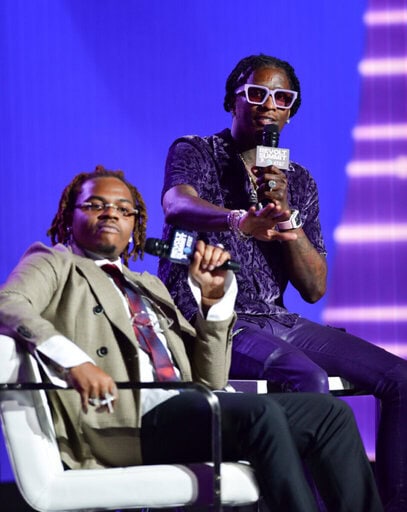Here’s what the potential reintroduction of the RAP Act could mean for the future of hip-hop, politics, and the lyrics-to-incarceration pipeline.
Rap is an art form that has been scrutinized since the earlier days of its prominence. A well-known example of its publicized criticism was seen during the rise of N.W.A in the 1980s. Along with radio stations refusing to play the Compton hip-hop group on its airwaves, politicians launched attacks that condemned their lyrics, according to the Los Angeles Times.
“We had lyrics,” original N.W.A member Ice Cube said, according to the outlet. “That’s what we used to combat all the forces that were pushing us from all angles: Whether it was money, gang-banging, crack, LAPD. Everything in the world came after this group.”
Legendary pioneers such as N.W.A paved the way for hip-hop artists to actively use the genre as a creative outlet. Despite the groundbreaking genre reaching its 50th anniversary, the form of expression is still under attack, especially by the judicial system. However, a potential first-of its kind federal law hopes to put the mistreatment to rest for good.
The Time is Now
In July 2022, the Restoring Artistic Protection Act (RAP Act) was introduced in the U.S. House of Representatives by Congressmen Hank Johnson (GA-04) and Jamaal Bowman (NY-16). The bill “limits the admissibility of evidence of a defendant’s creative or artistic expression against the defendant in a federal criminal case,” as previously reported by Boardroom’s Randall Williams.
Such a revolutionary act would play in the favor of today’s rappers including one of the most controversial cases involving rap lyrics used as evidence, Young Thug.

Effects of Criminalization of Hip-Hop in Real-Time
In May 2022, Young Thug, whose real name is Jeffery Lamar Williams, was arrested and charged with one count each of conspiring to violate Georgia’s Racketeer Influenced and Corrupt Organizations (RICO) Act and participating in criminal street gang activity behind his alleged gang, Young Slime Life, also known as YSL, ABC News reported in January around the start of his trial.
What’s more, the 65-count RICO indictment included the Atlanta rapper being charged with “an additional count of participating in street gang activity, three counts of violating the Georgia Controlled Substances Act, possession of a firearm while committing a felony and possession of a machine gun.”
As shared in the aforementioned Boardroom report, fellow YSL rapper Gunna was released from Fulton County Jail after pleading guilty to a racketeering charge and accepting a plea deal. While his release sparked online controversy in the hip-hop world, the main concern that remains is the cause for why he was placed in the position in the first place — the racist practice of using lyrics against rappers.
In December 2022, Brian Steel, Young Thug’s attorney, filed a motion requesting for the court not to use his client’s lyrics as it would create prejudice among the jury. Proposed two months after Young Thug was initially arrested, Johnson and Bowman’s RAP Act, if approved, has the potential to change the future of hip-hop.
What That Future Could Look Like & Preserving The Art
The bigger picture of the potential passing of the RAP Act would allow for today’s rappers to exemplify to the next generations of what it looks like to not be artistically limited due to the genre no longer being under constant investigation. The importance of legislation is far from lost on rappers as they have been displaying the sentiment of “whatever affects one directly, affects all indirectly.”
Back in January 2022, the likes of Jay-Z, Meek Mill, Fat Joe, and more backed the New York bill “Rap Music on Trial,” which was passed by the State Senate in May 2022, according to Okayplayer. The movement for justice for hip-hop spread from moments such as an open letter signed by Drake, Megan Thee Stallion, and more in protest to the music industry backing the California bill banning the use of rap lyrics as evidence signed into law by Governor Gavin Newsom in September 2022.
It’s all been a collective effort towards federal change that allows rap music the right to be what it’s always been – art.
More Of A Focus On The Essence Of Hip-Hop
Rap music has inspired and changed the lives of the masses through its compelling storytelling. However, the positive impact is oftentimes overshadowed by the judicial system being adamant on incriminating Black creativity. What also tends to get lost is the origin for why hip-hop was born in the 1970s, which was to serve as an outlet in the midst of the racial barriers and issues that Black and brown communities faced.
As it’s clear that racial inequalities continue to present themselves today, hip-hop without limitations is still a crucial necessity.

Fight Against Black Incarceration
In 2021, CNN reported that Black Americans are nearly five times more likely than the rate of white Americans to be incarcerated in state prisons. According to researchers at the University of Richmond, at least 500 cases from 2009 to 2019 used rap lyrics in criminal trials.
As the RAP Act would decrease the number of rappers charged and locked up due to the sway of lyrics being used in court, it creates a correlation to playing a role in combating the alarming rate of racial disparities in the U.S. criminal justice system. The future of hip-hop looks like rappers being able to freely express themselves instead of perceived as criminals until proven otherwise.
Hip-hop has been recognized as the biggest genre globally, as well as the most imitated yet it has never truly been fully accepted nor protected on a wide scale. Despite the odds, 50 years in, look at what it has still blossomed into. If the RAP Act is signed into law, just imagine how even more limitless the future of hip-hop can be.